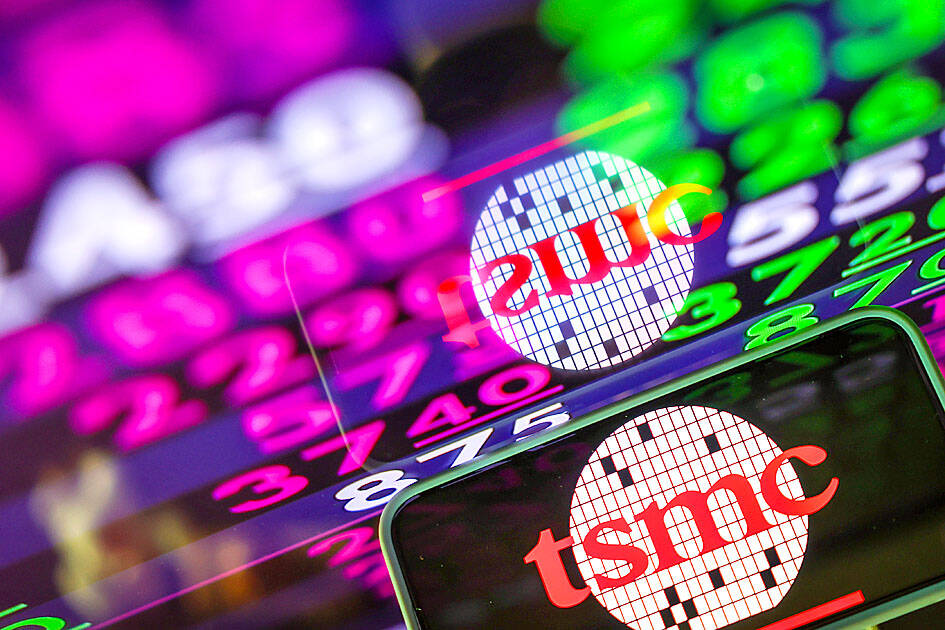Taiwan Semiconductor Manufacturing Co’s (TSMC, 台積電) revenue rose 33 percent year-on-year last month, in a positive signal to investors betting on a smartphone market recovery and sustained demand for Nvidia Corp’s artificial intelligence (AI) chips.
Sales reached NT$250.87 billion (US$7.8 billion) last month, slowing from the previous month’s 45 percent growth to a record NT$256.95 billion.
In the first eight months of this year, TSMC’s sales totaled NT$1.77 trillion, up 30.8 percent from a year earlier.

Photo: CNA
While just a month’s snapshot, the results could assuage concerns about whether the market has overestimated the durability of AI infrastructure spending.
Nvidia’s shares shed about US$279 billion on Tuesday last week in their biggest single-day loss, after reporting earnings that failed to live up to the loftiest expectations.
That puts TSMC on track to beat average projections for third-quarter revenue by a slight margin, Bernstein analysts led by Mark Li wrote.
“If September follows the average seasonality of the past eight years, third-quarter revenue would come 5 percent to 6 percent above both the guidance mid-point & consensus,” he said.
For the third quarter, analysts expect the chipmaker’s sales to grow 37 percent year-on-year. In July, TSMC told investors that its third-quarter revenue would range between US$22.4 billion and US$23.2 billion.
Taiwan’s largest company now makes more than half of its revenue from high-performance computing, the segment of its business driven by AI demand. Nvidia’s go-to chipmaker is also the main manufacturer for the iPhone’s main processor.
Apple Inc on Monday unveiled the iPhone 16, built for AI “from the ground up,” but with capabilities that would be gradually added to the device via software updates. Wall Street is betting on a bounce-back in demand for mobile devices.

NEW IDENTITY: Known for its software, India has expanded into hardware, with its semiconductor industry growing from US$38bn in 2023 to US$45bn to US$50bn India on Saturday inaugurated its first semiconductor assembly and test facility, a milestone in the government’s push to reduce dependence on foreign chipmakers and stake a claim in a sector dominated by China. Indian Prime Minister Narendra Modi opened US firm Micron Technology Inc’s semiconductor assembly, test and packaging unit in his home state of Gujarat, hailing the “dawn of a new era” for India’s technology ambitions. “When young Indians look back in the future, they will see this decade as the turning point in our tech future,” Modi told the event, which was broadcast on his YouTube channel. The plant would convert

‘SEISMIC SHIFT’: The researcher forecast there would be about 1.1 billion mobile shipments this year, down from 1.26 billion the prior year and erasing years of gains The global smartphone market is expected to contract 12.9 percent this year due to the unprecedented memorychip shortage, marking “a crisis like no other,” researcher International Data Corp (IDC) said. The new forecast, a dramatic revision down from earlier estimates, gives the latest accounting of the ongoing memory crunch that is affecting every corner of the electronics industry. The demand for advanced memory to power artificial intelligence (AI) tasks has drained global supply until well into next year and jeopardizes the business model of many smartphone makers. IDC forecast about 1.1 billion mobile shipments this year, down from 1.26 billion the prior

People stand in a Pokemon store in Tokyo on Thursday. One of the world highest-grossing franchises is celebrated its 30th anniversary yesterday.

Zimbabwe’s ban on raw lithium exports is forcing Chinese miners to rethink their strategy, speeding up plans to process the metal locally instead of shipping it to China’s vast rechargeable battery industry. The country is Africa’s largest lithium producer and has one of the world’s largest reserves, according to the US Geological Survey (USGS). Zimbabwe already banned the export of lithium ore in 2022 and last year announced it would halt exports of lithium concentrates from January next year. However, on Wednesday it imposed the ban with immediate effect, leaving unclear what the lithium mining sector would do in the